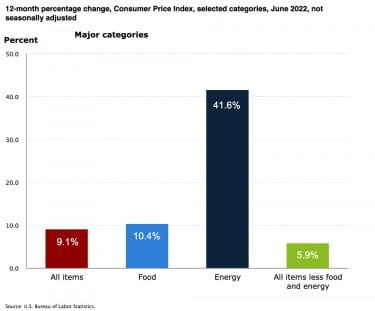Nate Bruce, Farm Business Management Specialist, nsbruce@udel.edu
One technical definition of a recession is when the national gross domestic product (GDP) shrinks in two consecutive quarters occurs. This last Thursday (7/28) the Commerce Department announced GDP shrunk by 0.9% from April to June, meaning the economy has entered this definition of a technical recession. The definitive call for determining whether the economy is in a recession is up to the National Bureau of Economic Research, which defines a recession as “a significant decline in economic activity” lasting “more than a few months.” The set of circumstances for the recent economic downturn are broad ranging from Covid, supply chain issues, labor issues, federal government relief packages, and geopolitical issues such as the Ukraine War.
How the factors involved in this recent economic downturn impact agricultural producers is not fully known but can vary widely depending on the crops or livestock grown. A recent article from the University of Georgia Cooperative Extension discusses this and a link to the article is provided below. They stated that the agricultural industry typically serves as a buffer to the economy during periods of economic recession. Producers raising traditional row crops, chickens, cattle, or anything similar will most likely remained unaffected and even provide support to the state economy during periods of recession because production will more than likely not falter. Those raising niche products such as specialized meat products, vegetables, and particularly cotton may feel recessionary pressures greater because consumer spending is lessened. The consumer price index (CPI), which is a measure many economists use to measure inflation, jumped to 9.1% in June. Other categories included food increasing to 10.4%, energy at 41.6%, and all other items less food and energy at 5.9%.

https://newswire.caes.uga.edu/story/8997/recession-and-agriculture.html
